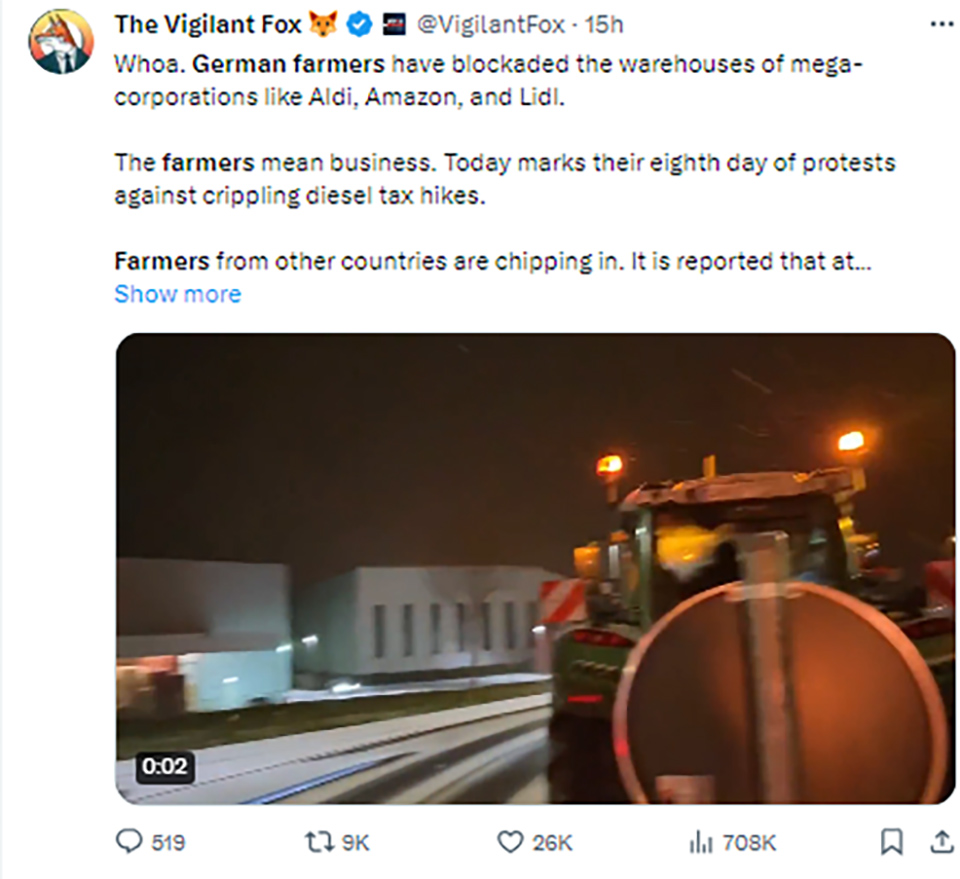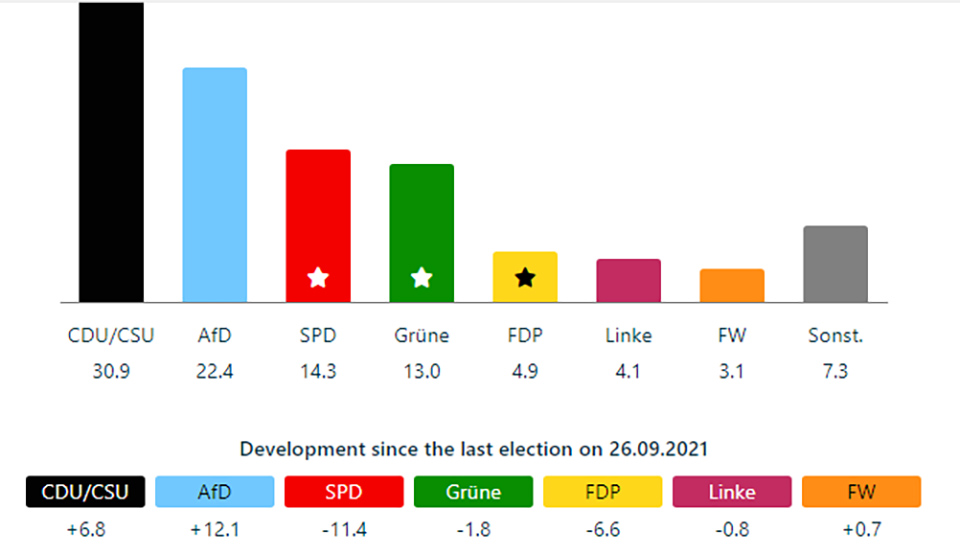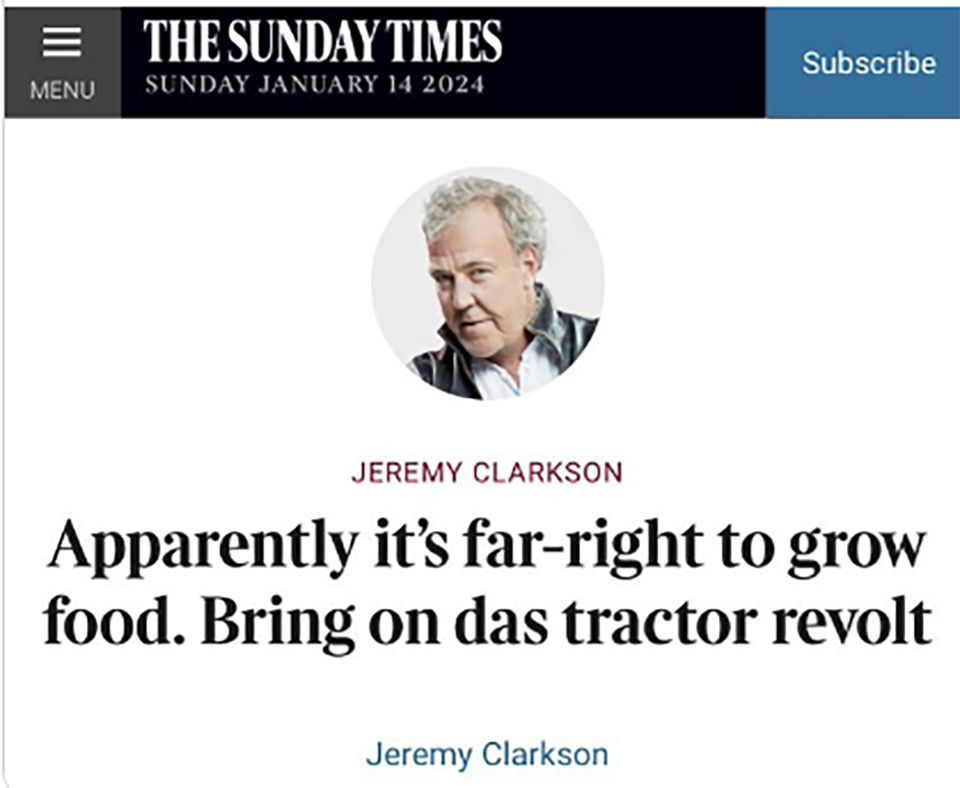As world leaders and others gathered in Davos for the annual meeting of the World Economic Forum, German farmers took centre stage in huge protests timed to coincide with the event – while focusing on the policies of the German coalition government of Social Democrats, Greens and Free Democrats towards agriculture.
On Monday, a crowd estimated to be over ten thousand, and supplemented by thousands of tractors, blocked the entrance to the Brandenburg Gate in Berlin to protest against taxation and subsidy proposals which the organisers claim will devastate the agricultural sector.
The main slogan of the farmers is “Ohne Landwirte, Keine Zukunft – Without Farmers, No Future” – though it could also be summed up as “Stop. We’ve Had Enough”, which they spelled out spectacularly in tractor lights in Niedersachsen.
Farmer's aligned their tractors to spell out "Stopp! Wir haben die schnauze voll"
English translation: "Stop! We've had enough!" pic.twitter.com/4QtwxQq7GJ
— Freda (@Freda8991) January 14, 2024
INCREDIBLE
Tractors stretching as far as the eye can see.
German farmers are not giving up.
SHARE if you support the farmers
🚜🇩🇪🚜🇩🇪🚜🇩🇪pic.twitter.com/ULao9j9wyr
— PeterSweden (@PeterSweden7) January 15, 2024
The main focus of the farmers’ anger has been the proposal to phase out fuel subsidies. The cuts aimed at the agricultural sector have been pitched within the context of addressing climate change and sustainability.
Farmers regard themselves as having become the scapegoat of a decision by the constitutional court in November to force chancellor Olaf Scholz government to withdraw proposals for a Green-focused 60 billion Euro budget.
German farmers have created a huge mobilisation protest against government. Like the Canadian truckers and Dutch farmers, they are smeared as “right-wing”. Yet this is this sort of blue-collar protest that the left-wing used to show solidarity towards. pic.twitter.com/QYs0If2OA1
— James Melville 🚜 (@JamesMelville) January 16, 2024
The German farmers’ protest is a prime example of how to mobilise on a massive scale against government. This story should be headline news in every media outlet, but unsurprisingly, it’s on the margins. We should all be openly supporting the farmers.pic.twitter.com/RQCr8SWFfN
— James Melville 🚜 (@JamesMelville) January 15, 2024
The budgetary crisis and the protests by the farmers and other groups have meant that the coalition is facing a general election in 2025 with seemingly little hope of survival. Combined support for the SPD, Greens and Free Democrats has fallen by over 30% since the last general election in September 2021.

There has been a corresponding increase in support for the Chistian Democrats/CDU which has risen from 24.1 to almost 31%, making it the most likely force in the next government. However, its traditional partner the Free Democrats, currently polling at under 5%, is unlikely – on that showing – to be a viable partner, and another grand coalition with the SPD would at this stage be unpopular.
The major beneficiary of the current crisis has been Alternative für Deutschland (AfD) whose support has more than doubled since 2021 when it took 10.3%, and is now polling at over 22%. It is currently the most popular party – with one third of support in opinion polls – in four of the nine states of the federal republic.
Coalition with the AfD has been ruled out by all of the main parties including the CDU/CSU, and there is support within the SPD and the far left – which is currently on 4% – to ban the AfD from even participating in elections. Polls, however, have shown growing support for a right coalition; with it being the most popular option in the eastern states of Germany.

Germany: Polls and trends for the 2025 election (politpro.eu)
As in the Netherlands and elsewhere, the focus of farmers is much wider than any current taxation and other proposals from government. Hence the sea change in political preferences, as it is linked to what not only farmers and rural communities but many people in general regard as a leftist and in particular a green-left assault on the foundations of the economic and demographic foundations of community and national life.
With regard to the farming sector, there would indeed seem to be a concerted attempt by EU states, and the EU itself, to significantly downscale national agricultural production. This is largely under the rubric of the “need” to meet arbitrary emissions targets, sometimes packed with pablum regarding “climate justice” and “economic justice” that is used to explain the substitution of domestic and European food production by imports.
The Irish state is another example of this, and indeed it has extended beyond food to the shutting down of the turf generating sector. It is worthwhile, therefore, to recall that when the original EU, or European Economic Community, was first proposed that one of the key motivations in the co-operation of countries such as Germany and France which had fought two world wars, was to avoid the threat of starvation that had been one of the consequences of those wars, and earlier wars fought in Europe.
That was central to Article 39 of the Treaty of Rome of 1957. The foundation of the Common Agricultural Policy was to ensure the “availability of supplies” and that “supplies reach consumers at reasonable prices.” Fundamental to that was that “in the Member States agriculture constitutes a sector closely linked with the economy as a whole.” Even within its own criteria, then, the current policy of the EU and states which are going along with the policy of dramatically downsizing farming, is clearly at odds with those original aims. It particularly makes no sense that a country like Ireland with all its advantages in food production, including fishing, ought to be blindly following such a line.
In pushing the effective destruction, as increasing numbers regard it, of European farming and the traditional rural economy and community that have existed for many centuries, the narrative has taken a sinister turn. Pithily captured perhaps the other day in a heading on a piece for The Sunday Times by Jeremy Clarkson.
